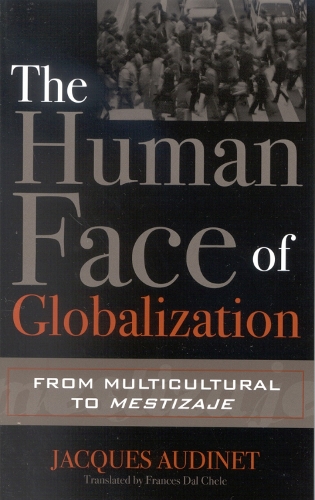
The Human Face of Globalization: From Multicultural to Mestizaje
(Paperback)
Publishing Details
The Human Face of Globalization: From Multicultural to Mestizaje
By (Author) Jacques Audinet
Bloomsbury Publishing PLC
Rowman & Littlefield Publishers
20th November 2004
United States
Classifications
General
Non Fiction
Indigenous peoples: religions, belief systems, cultural worldviews and spiritual
306
Physical Properties
Paperback
168
Width 144mm, Height 215mm, Spine 13mm
218g
Description
International immigration, massive migrations, economic globalization and a world-wide communications revolution have brought about a mixing of races, cultures and lifestyles unprecedented in human history. What are the implications of this phenomenon What options present themselves_a battle of cultures for power; a move toward communitarian cooperation, or, something new, the evolution of racially and culturally mixed societies Anthropologist and sociologist Jacques Audinet proposes an alternative to culture wars and simple multiculturalism as he explores the history and evolution of mestizaje, the mixing of races and cultures resulting in a third and new force able to ease the tensions between the original two. Audinet reviews the tragic history of imperial and colonial conquests and traces the growth of mestizaje, especially stimulated by literature, music and sports. Audinet argues that, instead of chasing or preserving the illusion of 'pure' races, we need to face the shifting boundaries of peoples and cultures. He acknowledges the uncertainty of the changes, but emphasizes the essential role that mestizaje can play in the avoidance of racial and cultural clashes while pursuing equality as part of the promise of a democratic society.
Reviews
In The Human Face of Globalization, Jacques Audinet writes against the insane dreams of the 20th centuryespecially all forms of cultural and social segregation founded on violence. He discovers that mestizaje, the interpenetration and mixing of cultures, in its contemporary movements and forms, is both an exorcism and a dynamic model for healthy and creative change. Mestizaje critiques the monovisions and the monologues of the cultural purists and the nativists. In Audinets vision of our global existence, human expressions of art, gastronomy, mourning, love and the imagination will survive and thrive only through the embrace and cultivation of mestizaje, which will help translate us not into new divisions but into the renewal of cultural life. -- Davd Carrasco, Neil L. Rudenstine Professor of the Study of Latin America, Harvard University
From Alexander the Great and the Persian princess Roxane to Malinche and the European conquest of the Americas to today's globalized world, Audinet unveils the dangers and creative possibilities of mestizaje. Grounding his analysis in the corporeal and cultural experiences of contemporary life, he deftly illuminates the dynamics of mestizaje and its significance for the future of humanity. -- Timothy Matovina, associate professor of theology and director of the Cushwa Center for the Study of American Catholicism, University of Notre Dam
Mestizaje (metissage, cross-breeding) is a cultural and biological fact not only in the Americas but all over the word. In this important book, Audinet argues that taking a stance on mestizaje is taking a stance on a direction for humanity. -- R Stephen Warner, professor of sociology, University of Illinois at Chicago
Author Bio
Jacques Audinet is Professor Emeritus in Anthropology at the University of Metz and l'Institut Catholique de Paris. He has taught in the United States, Canada and Latin America and remains involved with the Mexican American Cultural Center in San Antonio, Texas.
